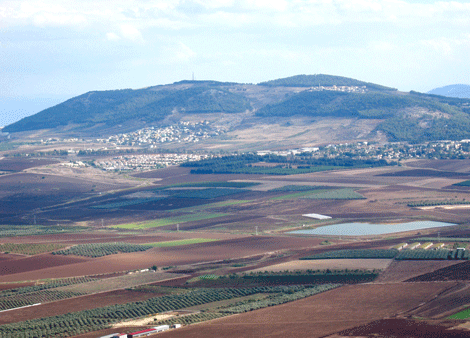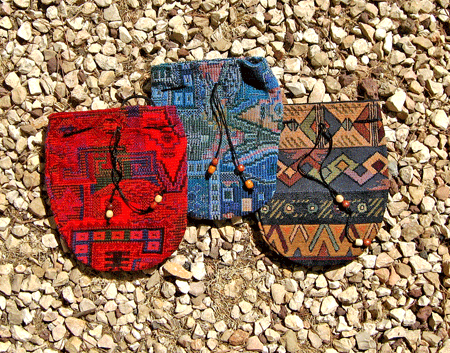|
 |
|
 |
|
|
The Witch of En Dor was an outlaw. Her
practice of calling up the spirits of the
dead, once popular and in great demand, was
now banned. She then must have been
frightened when three strangers appeared at
her doorstep in the thick of darkness. Not
too far off, the Israelites were facing off
against the Philistines for a decisive
battle over control of the lucrative trade
routes running through the Jezreel Valley.
|
When one of the men, bent over to disguise
his extraordinary height, asked her to
divine up a ghost, whomever he named, she
demurred. She said that Saul, the king
of Israel, had exiled everyone engaging in
that now illegal activity and that the
stranger was trying to ensnare her.
But the stranger swore that "As the Lord
lives, there shall be no punishment given to
you for this thing."
The stranger (who was Saul) then asked her
to bring up Samuel. (By the way, this
bizarre episode is the only scene in the
Hebrew Bible where a character is actually
summoned up from the netherworld.)
|
|
|
|
 |
|
Photo:
Gila Yudkin |
|
Jezreel Valley where
Saul's men searched for a medium or fortune
teller |
|
|
|
When the witch saw an old man in a cloak, a
god-like figure, rising up from the earth,
she shrieked, knowing she had been deceived. That Saul was the stranger before her. When
she described the figure, Saul realized that
the spirit was Samuel and he bowed down in
dread with his face to the ground. |
|
|
|
 |
|
William
Blake around 1800 | Courtesy of Wikipedia
Commons |
|
The Witch of En Dor
raising the spirit of Samuel |
|
|
|
Samuel was annoyed and demanded to know why
Saul had disturbed his rest. Saul protested
that he had been praying for a sign about
the outcome of the battle and had not
received a response, not by the prophets,
nor by dreams, nor by the Urim.
|
|
|
|
(The Urim and its counter-part, the Thummim
might have been the gemstones worn on the
high priest's breastplate and consulted on
critical issues facing the nation. They
would give a positive or a negative response
to questions posed by the high priest, kind
of like a Ouija board. Some propose that the
gemstones on the breastplate would light up
in varying patterns or angles, thus
revealing the divine will. Saul, however,
got no response.) |
|
|
|
Samuel then told Saul, "Tomorrow you and
your sons will be with me!" |
|
|
Saul fainted in fright, falling full-length
across the ground.
|
|
 |
|
Martynov
1857 | Courtesy of Wikipedia
Commons |
|
A distressed Saul faints
when he hears Samuel's prophecy |
|
|
|
Saul hadn't eaten for twenty four hours. Now
here is where the witch (or medium or
sorceress or "ghost-wife" as she is
alternately called) showed compassion.
She hastened to kill a fatted calf and baked
matzos which she brought before Saul and his
servants. The witch encouraged the
despairing monarch to eat. As Rabbi
David Wolpe puts it, eating is
"the ancient Jewish formula for recovery
from distress." |
|
|
|
So, what we have here is the outlawed witch
of En Dor, defiled by "politically
incorrect" or actually religiously incorrect
views, is the one who showed mercy to Saul. The law of Leviticus 19:31 stated very
clearly, "Do not turn to mediums or consult
familiar spirits or you will be defiled by
them."
|
|
|
|
Yet, some scholars (including first
century AD historian Josephus Flavius)
consider the witch of Ein Dor to be the most
altruistic character in the entire episode. She took in a complete stranger and in her
human kindness she comforted and nourished
the condemned king. And she served him
his last supper. |
|
|
|
American humorist
Mark Twain admired the witch of En Dor as
well. During his 1867 pilgrimage to the holy
land, Mark Twain visited the witch's abode
at En Dor. He wrote that he was shown "a
dismal cavern once occupied by the veritable
Witch of En Dor. In this cavern, tradition
says, Saul, the king, sat at midnight, and
stared and trembled, while the earth shook,
the thunders crashed among the hills, and
out of the midst of fire and smoke the
spirit of the dead prophet rose up…."
|
|
|
|
 |
|
Copyright
2014 by Gila Yudkin |
|
Map showing En Dor below
Mount Tabor in the Jezreel Valley |
|
|
|
But most of all, Mark Twain was mesmerized
by the character of the witch. So much so,
that he bought a pipe purported by the
Beduin hawker to have once belonged to the
witch herself. Mark Twain described the pipe
like this, |
|
|
"It was the "humbliest" pipe I ever saw -- a
dingy, funnel-shaped, red-clay thing,
streaked and grimed with oil and tears of
tobacco, and with all the different kinds of
dirt there are, and thirty percent of them
peculiar and indigenous to En Dor and
perdition. And rank? I never smelt anything
like it. It withered a cactus that stood
lifting its prickly hands aloft beside the
trail. It even woke up my horse….
I felt that this pipe had belonged to the
original Witch of En Dor as soon as I saw
it; and as soon as I smelt it, I [just] knew
it."
|
|
 |
|
Holy Land pouch where the witch
of En Dor could have stored her pipe! |
|
|
As Mark Twain left En Dor smoking the
foul-smelling pipe, he realized that all the
boys in his party began distancing
themselves from him. Then henceforth,
whenever he felt like being alone at the
front of the pack, he would waft a few
whiffs from the witch's pipe that would send
his companions gasping and strangling to the
rear…
Unfortunately, that curious relic -- the witch's pipe
--
has vanished. |
|
|
|
Copyright 2016 Gila Yudkin. Permission
needed for any reuse. |
|
|
|
 |
|
"Traditional" sling that
killed Goliath |
|
|
|
COMING TO
JERUSALEM?
BOOK GILA for your customized private tour |
|
|
|
The witch of En Dor has been a source of
inspiration to both artists and writers.
British novelist and poet Rudyard Kipling
was inspired by First Samuel 28:7 ("Behold
there is a woman that has a familiar spirit
at En Dor") to write a poem titled "En Dor"
after the death of a son. Here are two
stanzas: |
|
The road to En-dor is easy to tread
For Mother or yearning Wife.
There, it is sure, we shall meet our Dead
As they were even in life.
Earth has not dreamed of the blessing in
store
For desolate hearts on the road to En-dor.
|
Oh the road to En-dor is the oldest road
And the craziest road of all!
Straight it runs to the Witch's abode,
As it did in the days of Saul,
And nothing has changed of the sorrow in
store
For such as go down on the road to En-dor!
|

